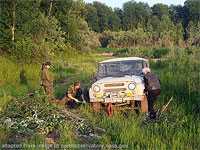Far East development program to 2025 sent back for revisions – paper

MOSCOW. Feb 20 (Interfax) – The government program for the Social and Economic Development of the Far East and Baikal Region for the Period to 2025, drafted by the Far East Development Ministry, was discussed at a meeting held by First Deputy Prime Minister Igor Shuvalov, business daily Vedomosti reported on Wednesday.
“The document was not officially submitted to the government, but has already been considered at a meeting with First Deputy Prime Minister Igor Shuvalov and was sent for revisions,” the paper quoted a ministry employee as saying.
An official who attended the meeting said “Shuvalov thinks the draft was badly prepared.” A representative of Shuvalov’s office confirmed that the meeting was held, but did not comment on the results, the paper said.
The program is being revised and will be presented at the end of February, a representative of the Far East Development Ministry said.
Vedomosti, which has a copy of the draft program, said it would cost the federal budget alone 5.7 trillion rubles, and the current plan is nearly ten times less.
The requested amount is high and unreasonable, a federal official said, adding that it could even increase since the program does not even mention spending on the overhaul of the Baikal-Amur Mainline and Trans-Siberian Railway, which “is another 1.5 trillion-2 trillion rubles.”
But the region needs an investment boost and accelerated development, the authors of the program argue. Every government ruble spent will attract more than four nongovernment rubles, the ministry claims.
Far East Development Minister and presidential envoy to the Far East Federal District Viktor Ishayev said spoke about the program earlier in an interview with Rossiyskaya Gazeta. “At least 200 billion rubles in federal money will be needed. The ratio for attracting private money will be 1 to 5. In other words, we’ll get another trillion rubles for the program from businesses,” Ishayev said.
In addition, he said another 300 billion-350 billion rubles could be raised “thanks to the multiplier effect.”
